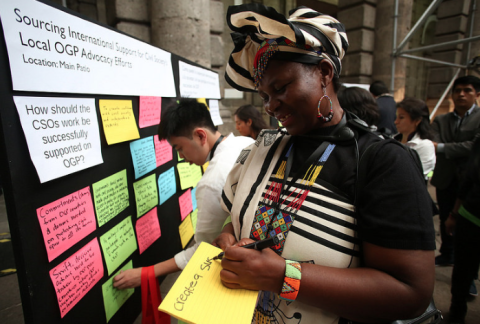
"Open" has become a new buzzword for many governments around the world. But what should an open government do and how can people help shape this new landscape?
From President Obama's memorandum signed on his first day in office through to the launch of the Open Government Partnership (OGP) in 2011 with eight countries onboard, more and more governments around the world are making promises about increasing openness and transparency.
The OGP now counts 69 countries as members with more countries looking to join soon. And, in October 2015, South Africa took over as co-chair of the OGP, shifting the leadership focus of the open government movement to Africa.
But are all these governments - and others outside of the OGP - living up to their promises of openness? The OGP has been criticized for making it too easy for countries to join and stay in the partnership without fulfilling the required criteria relating to fiscal transparency, access to information, public officials asset disclosure and citizen engagement.
So to reinforce efforts making real strides toward open government across Africa, more support is needed from media, technology and civil society groups to make sure governments keep to their promises.
To help, my team at Code for Africa joined forces with Open Knowledge to launch an open government fellowship scheme where we have spent six months providing support and advice to fellows in Ghana, Nigeria, Rwanda and Uganda. So what have our fellows being working on?
With corruption being a huge problem for Nigeria, Seember Nyager has spent her fellowship building awareness of Open Contracting in the country and demonstrating how openness in procurement practices would be of benefit to the government. She has met Nigeria's Attorney General and other high ranking officials, consulted with open contracting advocates in the Ukraine and Chile, and created budeshi.org, a site to explain what she's pushing for as well as showcasing what could be done with open contracting data.
In Ghana, Suhuyini Salim Shani has shown how important citizen engagement is to ensuring that governments are reaching more people in communities affected by national issues. His work has focused on how mobile tools and surveys can be best utilized to achieve this and he has been exploring future partnerships with the Code for Ghana team.
With the 2016 elections fast approaching in Uganda, Irene Ikomu has bolstered the parliamentary monitoring work that she has done over the last five years with Parliament Watch Uganda by exploring how to give citizens more ways to follow the work of their MPs. She was also a featured speaker at the first Africa Open Data Conference in Tanzania.
Access to information and open data are the issues that our Rwandan fellow, Claude Migisha, chose to focus on. During his fellowship, he has raised awareness of Sobanukirwa, the access to information website for Rwanda which he co-created, as well as submitting feedback on Rwanda's draft national open data policy. Now studying ICT4D in the UK, Claude took up the opportunity to receive open data training from the Open Data Institute and wrote up his experience with lessons that other countries could learn from the UK.
The efforts of our fellows - as well as others being supported by Code for South Africa - have pushed the "open" movement forward. They also show that there is still much to be done in every country to encourage governments to embrace true open government rather than touting empty promises.
This post is also published on IJNet, which is produced by ICFJ.
Image CC-licensed on Flickr via Open Government Partnership.